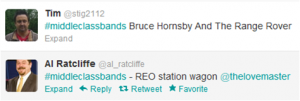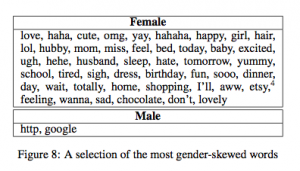Earlier this week, the hashtag #middleclassbands was trending on Twitter, and in that such tags tend to please my love of clever wordplay I clicked over to see. And indeed it was the case that linguistic ingenuity abounded, but what I didn’t expect to find is wild disagreement over what constitutes middle-classness.
Granted, some of this may be contortions produced by the need to be punny, but within the general categories of things middle-class folks are imagined to do and be and buy there were what seemed to me to be downright contradictions.


 Tweet-ers identified this group as consuming Applebee’s (which strikes me as lower in the class spectrum), hummus (which seems about right for bourgie foodie types), and foie gras (pretty upper class).
Tweet-ers identified this group as consuming Applebee’s (which strikes me as lower in the class spectrum), hummus (which seems about right for bourgie foodie types), and foie gras (pretty upper class).
Middle class folks, the TT contended, drive station wagons and Range Rovers (things which are not like each other). They also  shop at IKEA, which I for one know as a place folks go for cheap furniture (sometimes, cheap furniture that looks expensive).
shop at IKEA, which I for one know as a place folks go for cheap furniture (sometimes, cheap furniture that looks expensive).
The middle class can also be identified, according to Twitter-ers, by its correct spelling, linking this class status to education.


 Indeed, the only thing that Twitter seemed to agree on about middle-class folks is that they work in office jobs, which I guess does confirm the death of union-enabled blue collar middle-classness.
Indeed, the only thing that Twitter seemed to agree on about middle-class folks is that they work in office jobs, which I guess does confirm the death of union-enabled blue collar middle-classness.
What’s interesting about this is not that some of these people are “right” in identifying the middle class and some are “wrong.” It’s that “middle class” doesn’t mean the same thing to everyone.
The hashtag was started by UK-based The Poke, seemingly a humor site. Thus, some of the tweets are likely from Brits, whereas others are from elsewhere (not least because there are no Applebee’s in the UK, according to the company’s site). Indeed, many of them “feel” American to me, though that may be ethnocentrism on my part.
Class varies rather dramatically between nations, to be sure, but also, as my parenthetical notes above were intended to suggest, it also varies within nations. Not sure why I keep using the Applebee’s example, but it may well be solidly middle-class for certain populations within the US even though it strikes me as trashy (which, let there be no mistake, is not a criticism but what I like about it).
This lack of agreement about what it means to be a member of a particular class is especially important in the contemporary moment as class is put back on the table in US politics. In the UK, it was always a term of relevance (and means your class of birth, not your contemporary income status, as I learned while using a demographic sheet designed with American sensibilities to collect data about a Brit), but—likely due to some combination of American individualist ideology and decades of anticommunist hysteria—it has not tended to be used in everyday discourse in my lifetime (though I myself see and use it a lot as a Marxist-flavor academic).
However, with the 2011 rise of Occupy Wall Street and its discourse of the 1% vs. the 99%, and with the Obama campaign’s appeals to improving the lot of the middle class rather than giving tax cuts to the wealthy, people are starting to speak the language of class again. The question is, though, which language is that?
If one’s “middle class” appeals are pitched at the foie gras and Range Rover crowd, the Applebee’s and station wagon folks will be alienated. If you call out folks making over $200,000 a year as wealthy it’ll hold for lots of parts of the country, but not places where the cost of living is sky-high, because there those folks are decidedly middle-class.
There are pitfalls to putting class back into the discussion, then, but that should not be taken to mean we shouldn’t do it. Indeed, these pitfalls are, I think, the result of the fact that class has been off the radar for so long that there has been no opportunity to form a popular consensus about what it means.
It’s this lack of knowledge that enables a state in which, to be flippant, everyone thinks they are middle class and will someday be rich if they work hard enough, and therefore are not only opposed to redistributive policies but tend to vote against their own current economic interests.
So this TT’s motley composition, far from being a sign of lazy tweeting, is actually pretty revealing about how class works in the US in the contemporary moment.
Blogs are going to be a bit patchy for a while. Though there are lots of important and interesting things happening in the world right now, not many are jumping out at me as suitable for this genre. Also I’m going to be traveling for most of July.








